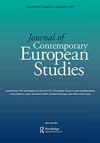The response of the European parties to the transformation of the socio-political cleavages
IF 1.8
3区 社会学
Q1 AREA STUDIES
引用次数: 0
Abstract
ABSTRACTFrom a bottom-up perspective, cleavage theory links the socio-economic trends existing in the political community with the shape acquired by party politics. Globalization and European integration impacted European society, creating novel socio-economic divides and bringing new social, cultural and economic issues into the political discussion. The impact of the novel cleavage over the pre-existent societal socio-political fractures acquires a central role in the study of European Union politicization. Deploying critical discourse analysis (CDA) and discourse-historical approach (DHA), this study aims to comprehend how the emergence of a novel cleavage has influenced the discourse of the mainstream European parties. The manifestos of the European Christian democratic, socialist and liberal parties from the last three European Parliament elections are analyzed to assess the contemporary relevance of the left-right political competition in a scenario characterized by the salience gained by transnational issues and the electoral success of populist elites.KEYWORDS: European party politicscritical discourse analysisdemocratic legitimacyEuropean integrationsocio-political studiestransnational democracy Disclosure statementNo potential conflict of interest was reported by the author(s).欧洲政党对社会政治分裂转变的反应
【摘要】割裂理论从自下而上的角度,将政治共同体中存在的社会经济趋势与政党政治所获得的形态联系起来。全球化和欧洲一体化影响了欧洲社会,造成了新的社会经济鸿沟,并将新的社会、文化和经济问题带入了政治讨论。新分裂对先前存在的社会政治分裂的影响在欧盟政治化研究中占有中心地位。运用批判性话语分析(CDA)和话语历史方法(DHA),本研究旨在理解新分裂的出现如何影响欧洲主流政党的话语。本文分析了最近三次欧洲议会选举中欧洲基督教民主党、社会主义和自由主义政党的宣言,以评估在跨国问题获得突出地位和民粹主义精英选举成功的情况下左右政治竞争的当代相关性。关键词:欧洲政党政治话语分析民主合法性欧洲一体化社会政治研究跨国民主披露声明作者未报告潜在利益冲突。
本文章由计算机程序翻译,如有差异,请以英文原文为准。
求助全文
约1分钟内获得全文
求助全文
来源期刊

Journal of Contemporary European Studies
Multiple-
CiteScore
2.70
自引率
7.70%
发文量
84
期刊介绍:
The Journal of Contemporary European Studies (previously Journal of European Area Studies) seeks to provide a forum for interdisciplinary debate about the theory and practice of area studies as well as for empirical studies of European societies, politics and cultures. The central area focus of the journal is European in its broadest geographical definition. However, the examination of European "areas" and themes are enhanced as a matter of editorial policy by non-European perspectives. The Journal intends to attract the interest of both cross-national and single-country specialists in European studies and to counteract the worst features of Eurocentrism with coverage of non-European views on European themes.
 求助内容:
求助内容: 应助结果提醒方式:
应助结果提醒方式:


